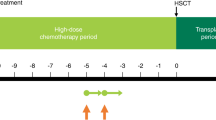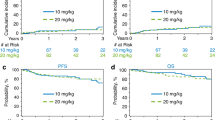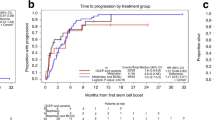Abstract
The prognosis in patients with primary brain tumors treated with surgery, radiotherapy and conventional chemotherapy remains poor. To improve outcome, combination high-dose chemotherapy (HDC) has been explored in children, but rarely in adults. This study was performed to determine the tolerability of three-drug combination high-dose thiotepa (T) and etoposide (E)-based regimens in pediatric and adult patients with high-risk or recurrent primary brain tumors. Thirty-one patients (13 children and 18 adults) with brain tumors were treated with high-dose chemotherapy: 19 with BCNU (B) and TE (BTE regimen), and 12 with carboplatin (C) and TE (CTE regimen). Patients received growth factors and hematopoietic support with marrow (n = 15), peripheral blood progenitor cells (PBPC) (n = 11) or both (n = 5). The 100 day toxic mortality rate was 3% (1/31). Grade III/IV toxicities included mucositis (58%), hepatitis (39%) and diarrhea (42%). Five patients had seizures and two had transient encephalopathy (23%). All patients had neutropenic fever and all pediatric patients required hyperalimentation. Median time to engraftment with absolute neutrophil count (ANC) >0.5 × 109/l was 11 days (range 8–37 days). Time to ANC engraftment was significantly longer (P = 0.0001) in patients receiving marrow (median 14 days, range 10–37) than for PBPC (median 9.5 days, range 8–10). Platelet engraftment >50 × 109/l was 24 days (range 14–53 days) in children. In adults, platelet engraftment >20 × 109/l was 12 days (range 9–65 days). In 11 patients supported with PBPC, there was a significant inverse correlation between CD34+ dose and days to ANC (rho = −0.87, P = 0.009) and platelet engraftment (rho = −0.85, P = 0.005), with CD34+ dose predicting time to engraftment following HDC. Overall, 30% of evaluable patients (7/24) had a complete response (CR) (n = 3) or partial response (PR) (n = 4). Median time to tumor progression (TTP) was 7 months, with an overall median survival of 12 months. These TE-based BCNU or carboplatin three-drug combination HDC regimens are safe and tolerable with promising response rates in both children and older adults.
This is a preview of subscription content, access via your institution
Access options
Subscribe to this journal
Receive 12 print issues and online access
$259.00 per year
only $21.58 per issue
Buy this article
- Purchase on Springer Link
- Instant access to full article PDF
Prices may be subject to local taxes which are calculated during checkout
Similar content being viewed by others
Author information
Authors and Affiliations
Rights and permissions
About this article
Cite this article
Papadopoulos, K., Garvin, J., Fetell, M. et al. High-dose thiotepa and etoposide-based regimens with autologous hematopoietic support for high-risk or recurrent CNS tumors in children and adults. Bone Marrow Transplant 22, 661–667 (1998). https://doi.org/10.1038/sj.bmt.1701408
Received:
Accepted:
Published:
Issue Date:
DOI: https://doi.org/10.1038/sj.bmt.1701408
Keywords
This article is cited by
-
A phase II prospective study of sequential myeloablative chemotherapy with hematopoietic stem cell rescue for the treatment of selected high risk and recurrent central nervous system tumors
Journal of Neuro-Oncology (2010)
-
Pilot study of tandem high-dose chemotherapy and autologous stem cell transplantation with a novel combination of regimens in patients with poor risk lymphoma
Bone Marrow Transplantation (2005)
-
High-dose chemotherapy with autologous stem cell rescue in children with retinoblastoma
Bone Marrow Transplantation (2003)



